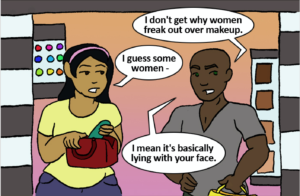Originally published on Good Men Project and cross-posted here with permission.

Credit: That Guy Who’s Going Places
“Sex just isn’t fun any more.”
“What!?” I exclaimed.
“I dunno. I just feel like its gotten to the point where if I want to sleep with someone, I should get a notarized, written statement of their consent. It’s just gotten crazy!”
I cannot tell you how many times I have had this conversation. As a sexual violence prevention educator, one thing is very clear to me: we suck at talking about sex.
I mean, for most of us, our only real models for learning about sexual communication are porn and television. Yet sex is a huge part of most people’s lives.
Many of us learn along the way (usually from a patient partner) how to communicate well in sex, but with as many as 1 in 4 women and 1 in 6 men experiencing sexual violence in their lifetime, it’s clear we need to completely revamp how we talk about sex.
When I was a teenager, I probably had 10 wildly embarrassing sex talks with my dad. They basically went like this:
“Jamie, being Catholic, we would obviously prefer that you wait until marriage. But as an OB and family physician, I know all too well the consequences of sex outside of marriage, so if you’re going to have sex, please be safe. If you need me to buy you condoms, I will. Just be careful.”
That’s it. About ten years after my first chat with my dad, I asked him, “In all of those awkward sex talks we had, why didn’t we ever talk about consent?”
His response? “I guess I didn’t think of it.” Nowhere was there even a hint that consent is an important part of sex. And certainly not the idea that we should be equally or more intentional about than traditional understandings of “safer sex.”
But I don’t blame my dad. No one ever taught him how to have that conversation.
♦◊♦
In her treatise on love and relationships, All About Love: New Visions, bell hooks notes,
Our nation is…driven by sexual obsession. There is no aspect of sexuality that is not studied, talked about, or demonstrated. How-to classes exist for every dimension of sexuality, even masturbation. Yet schools for love do not exist. Everyone assumes that we will know how to love instinctively (xxviii).
Her remarks about love are dead on, but despite the robust conversation about sex in the United States, there is one area of sexuality for which there are still too few schools: consent.
Too often, the conversation about consent (if it happens at all) goes like this:
Women, make sure you communicate what you want with a simple “Yes” or a “No.” If he doesn’t respect that, kick him in the balls.
Men, listen to what women tell you. No Means No!
While well-intentioned, thinking about consent in this way frankly sucks. First, it presumes heterosexuality (because sexual violence never happens in queer relationships, right?).
It also presumes that the only people that need to communicate their needs and desires are women and that women are the only people who might experience unwanted sexual advances or contact.
It says little of asking, only of listening. It assumes the only answers are yes and no.
Plus, it’s BLAND and it’s BORING!
And when something so important to our sexual relationships is only taught in bland, boring ways, is it any wonder that the rates of sexual violence are so damn high?
I mean, the vast majority of sexual violence happens between two people who know each other, often between people who have or have had a sexual relationship. Sexual violence is not primarily a problem of serial-rapists, roofied drinks, or someone jumping out of the bushes — though those things happen and must be addressed.
Many of those committing sexual violence don’t set out or intend to commit the act, and many are so out of communication with their partner that they don’t even realize they’ve done anything wrong!
Clearly, sexual violence is also a problem of communication.
If we hope to prevent the sexual violence that affects so many of those we love, we have to change the conversation. While consent should be about preventing sexual violence, it is about so much more.
It is also about creating healthy, fulfilling sexual relationships!
I want my consent to be fun, freaky, sexy, silly, seductive, creative, captivating! I want it all, and I want it healthy and mutual! What’s wonderful, though, is that it can be ALL of these things and more. Studies have shown that healthy, open communication leads to better sex.
And who doesn’t want better sex?
♦◊♦
Finding ways to ask for and give consent can be one of the most fun and satisfying aspects of sex!
So, whether you looking for a hook up, a hot and heavy make out session, or some ways to spice up your long-term sexual relationship, here are a few suggestions:
1. Know Yourself and What You Want
The single best thing we can do to encourage healthy, consensual sex is to know exactly what we want, how we want it, and how far we’re willing to go with any given person at any given time.
If, before things get hot and heavy, you have spent some time reflecting (perhaps writing?) about what you want and how far you want things to go, you will have a much easier time communicating your needs and desires and will be much more willing to do so.
Plus, if you know exactly what you like, exactly what gets you hot and gets you off, you will be able to tell your partner just how you want it. Ain’t nothing wrong with knowing what you want and demanding it between the sheets!
One great way to check in with yourself about what you want and need is a Yes, No, Maybe Chart. See below for more info.
2. Just Ask
What we’ve been told is that talking, particularly asking what our partner wants and if we can do this or that, ruins the mood. In reality, though, there are few things hotter than saying to your partner, “Tell me how you want it.”
Here are a few suggestions:
“Is this okay?”
“May I __________ your __________?”
“I want to ______________. May I?”
Better yet:
“Tell me what makes you hot.”
“What do you want me to do to you?”
“Where do you want my tongue/hands/fingers/lips/dick/pussy/(insert body part or slang of choice)?”
The first few are fantastic, but the last few are ideal: you give your partner complete agency to assert what they want and need to get off.
Plus, it gives them a chance to take things just as far as they want to go, I don’t know about you, but few things turn me on more than hearing my partner scream with pleasure.
And let’s face it: your partner knows a hell of a lot better than you do about what’s going to make her or him yell out in pleasure!
Oh, and straight dudes: many women have learned from experience and have been taught by other women that men aren’t going to care about their needs and desires and aren’t going to respect their boundaries. Trust me when I say that contradicting this experience and wisdom by simply asking has the tremendous power to get a woman hot. Really hot. Really really hot.
Contrary to popular wisdom, talking while it gets hot and heavy is sexy!
3. Listen, Listen, and Listen Some More
Again, I don’t know about you, but few things turn me on more than getting my partner off: yelling, screaming, biting pillows, digging in the nails, CRAZY.
Well, no matter how well I know my partner, I can’t read her mind. Thus, I need to listen.
Listening serves two important purposes in sex. First, it helps us know just what we need to do to make our partner lose their mind with orgasmic ecstasy. Second, it helps us make sure that we don’t accidentally hurt our partner by crossing boundaries.
There are two types of listening that are vital to safe, healthy, fun, satisfying sexual relationships:
The first is the most obvious: When someone yells “MORE!” get on it!
When someone whispers, “Stop,” we damned well better stop. Vocal communication is vital, but all that talking is useless if our partner is not listening! It’s so much more than “No means no!” It’s “yes” and “now” and “like that!” and “don’t stop!”
The second is the trickier one, but that doesn’t make it less important. We have to learn to listen to all of the non-verbal cues that our partner gives us.
Have you ever leaned in for a kiss, only to realize by the look on the person’s face that they DEFINITELY only thought of you as a friend? Yeah, that’s the kind of listening I’m talking about.
Now, some sexual violence prevention educators will tell you that you should never use body language as a gauge for consent. I couldn’t disagree more. Though we cannot and should not rely exclusively on body language as consent, it definitely is important!
If your partner doesn’t seem to into it, there is probably a reason. Plus, if you listen closely, your partner’s body language will tell you exactly what you need to change to bring them to that point of ecstasy.
The problem with listening, though, is that it can be really easy to get so into our own pleasure and to be so focused on getting off that we forget or refuse to listen to what our partner is trying to tell us.
This is why listening is, perhaps, the single most important aspect of consent.
4. Watch What You Drink
The common wisdom relating to sexual violence and alcohol says, “Watch your drink so that no one roofies it when you’re not looking.” But that’s not what I’m talking about when I say, “Watch what you drink.”
Alcohol makes communication difficult. I mean, have you ever tried talking to someone who’s totally schnockered? You’re lucky if you can make sense of half of what they say.
And God forbid that you get in bed with such a person. They’ll be drooling all over your neck and panting loudly in your ear while they dry hump you into oblivion.
Plus, when we’ve been drinking heavily, it can be pretty tough to check in with ourselves about what we want and need.
There’s a reason why among college students, 74% of men who have committed sexual violence were under the influence of alcohol when they did it, and 55% of survivors of sexual violence were under the influence of alcohol when they were assaulted (Koss, M.P. 1988. “Hidden Rape: Sexual aggression and victimization in a national sample of students in higher education”).
So am I saying that we shouldn’t drink if we’re looking to hook up? Absolutely not (though some folks choose never to engage in sexual behavior when they’ve been drinking, and that’s cool too).
But there are some important things to consider when we decide to get sexy while drunk.
1. Being clear about what you want sexually and how far you’re willing to go with any given person BEFORE you get drunk is important. If you have a pretty good sense of your boundaries (and a recognition that boundaries might change depending on the person and circumstance) before you start drinking, you are significantly more likely to be able to communicate your wants and needs once you’re intoxicated.
2. If you’ve been drinking, it means listening is even MORE important. We all know that alcohol inhibits our ability to process incoming information. Thus, if we’re wasted, it’s going to be a lot harder for us to ask for consent and listen to our partner.
So before you start drinking (or taking any other drug for that matter), take some time to think about what it is you might want from a hook up or from sex with your partner.
And think carefully about how well you’ll be able to listen at 2 drinks, 4 drinks, 6 drinks, or 8. A good rule to use is if you can’t stand up straight or can’t see yourself in the mirror without squinting or closing one eye, you’re probably going to struggle to respond to your partner, both in getting them off and in stopping when they say so.
♦◊♦
Still not sure about this whole consent thing? Here are a few ideas for making consent fun and sexy!
1. Roll the Dice
Whether you’re looking for a one-night hookup or to spice up things in a long-term relationship, sexy dice are where it’s at. One dice has an action (lick, kiss, blow, suck, etc.), the other has a body part or area of the body (breast, above waist, neck, etc.).
The beauty of these little bad boys is that they offer a chance to slow the pace of things without losing any sensuality or adventure. By slowing the pace and rolling the dice, you give your partner a distinct chance after each roll to say yes or no! They’re fun! They’re sexy! They encourage healthy consent! What’s not to like?
There are lots of varieties of sexy dice, but these are my favorite ones because they give those playing a little more leeway with how to play and how intimate you want things to get:
Pick up a pair here.
2. Get Hot… and Cold
When you were a kid, did you every play hot and cold? You’d hide something from your sibling or friend and tell them to find it. As they got closer, you’d say “you’re getting hotter! Hotter! Red hot! Burning up!” When they went in the wrong direction, it was, “Colder! Frigid! Antarctica!”
Well, playing that game in bed gives it a whole new spin! One partner can decide a place they’d like to be kissed, touched, licked, bitten, etc. The other must find it, and the first partner uses hot or cold to tell them where to go.
Again, it is a way to slow the pace of foreplay or sex without sacrificing any sexiness, and it’s great for a hookup or a long-term relationship. The best part, though, is that gives your partner complete control over how you touch them and where you touch them! If they want you to go down on them, it’s a fun way to get started. If they only want your hands above the waist, they can tell you in a fun and sexy way.
Oh, and throw in a blindfold if you want things to get extra sexy and kinky!
3. Try Yes, No, Maybe Charts
I don’t know about you, but there are a few areas of sex that I have long wanted to explore but haven’t out of shame and embarrassment. There’s always a chance that my partner is into those things too, but if I ask and they’re not, I’d be pretty red-faced.
Though there are some super liberated people who feel comfortable asking for exactly what they want, no matter how kinky or freaky, for the rest of us, there are Yes, No, Maybe Charts.
Interested in a little butt play but don’t know how to ask? Try a Yes, No, Maybe Chart!
Not really comfortable with someone sucking your toes, but you REALLY want to suck your partner’s toes until they cum? Try a Yes, No, Maybe Chart!
Want to feel a little pain (or a lot!) in sex but don’t know how to ask for that? Try a Yes, No, Maybe Chart!
Essentially, a Yes, No, Maybe Chart is a list of sex acts and topics related to sex with a space for you to express your comfort level with a simple Yes, No, or Maybe.
Yes, No, Maybe charts are a great way for you to check in with yourself about your wants, needs, desires, and comfort levels in various sex acts and things related to sex, and when done with a partner, they are a great way to start a conversation about what your sexual relationship can, does, and should look like!
While this is not necessarily first date stuff (though filling one out for yourself before a first date could be a great idea), it is a good way to start some important conversations with someone with whom you’re considering starting a sexual relationship. It’ll help you know what your partner is cool with, not so cool with, and what REALLY gets her or him off.
It even can be great for couples that have been together for a long time! Not too long ago, I was talking with a couple who had been together for 11 years, and they’d recently decided to fill out Yes, No, Maybe Charts together. They discovered a few things that one partner wanted to try and the other was comfortable with trying but that neither had ever expressed for fear that their partner might think it was weird or out there. Turns out their sex got WAY better after filling one out!
The best part about these bad boys, though, is that they encourage healthy, open communication about sex between partners. That’s what consent is all about!
If you want to download a chart, print it out, and get started, I’ve compiled a great Yes, No, Maybe chart, available here.
If you want to tailor your chart to your specific relationship or needs (as maybe you’ve already talked about some of the things on my .pdf version), here’s the same form in .doc format so you can edit to your heart’s content.
All of these Yes, No, Maybe resources were adapted from online sexual health and education site Scarleteen, which has a great and comprehensive list of Yes, No, Maybe topics that are well-paired with The Consensual Project’s Yes, No, Maybe blank chart!
Jamie Utt is a Contributing Writer for Everyday Feminism and a diversity and inclusion consultant and sexual violence prevention educator based in Minneapolis, MN. He lives with his loving partner and his funtastic dog, Chloe. He blogs weekly at Change From Within. Learn more about his work at www.JamieUtt.com. Follow him on Twitter @utt_jamie.
Search our 3000+ articles!
Read our articles about:
Our online racial justice training
Used by hundreds of universities, non-profits, and businesses.
Click to learn more
Most Read Articles
- « Previous
- 1
- …
- 30
- 31
- 32




















